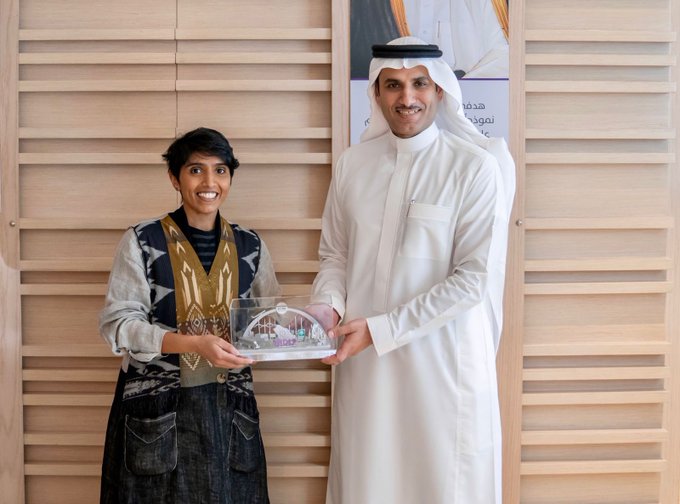As six-year-old Mishaal Ashemimry gazed at the far-off stars in the Unayzah desert sky in Saudi Arabia, it never occurred to her that one day she would be near these stars, greeting them and carrying the wishes of a nation that uses all of its knowledge to explore space and discover what secrets it holds for us.
Knowing this, Mishaal made a place for herself near those stars and became the first female engineer in the Gulf Cooperation Council countries to specialise in rocket and spacecraft engineering. She became an Arab star, doing her utmost to illuminate the path for others who aspired to follow in her footsteps.
Saudi engineer Mishaal Ashemimry holds bachelor’s degrees from Florida Institute of Technology in Melbourne in applied mathematics and aeronautical engineering. At twenty-two, NASA gave her a scholarship to pursue a master’s degree in aeronautical engineering, making her the first Saudi woman to work for the US space agency.
Pursuing academic success might compel an individual to dedicate their entire time to studying; however, Mishaal, having adopted excellence as her strategy, pursued tangible scientific research accomplishments to match her academic success. She realised her lifelong goal of creating rockets capable of launching small satellites (500 kg or less) into low Earth orbit when she founded the Mishaal Aerospace Company in Florida at the age of 26.
Designing the Future
In her capacity as a research assistant for NASA, engineer Mishaal Ashemimry designed and evaluated a thermonuclear rocket engine for the agency’s Mars mission. Along with these projects, she worked on 22 non-nuclear rockets in 2006, wrote software codes to analyse wind test data, and created multiple air navigation models.
She was named the 2015 Inspiring Woman, one of the top ten most powerful Arab women globally, and the recipient of a scientific achievement award from King Salman bin Abdulaziz Al Saud. She came in among the top 100 influential Arab women by “Business.com” magazine, and among the top 10 influential in her field in the Arab world by “Construction Week Online.”
Engineer Mishaal is an expert in missile engineering and consults for some foreign organisations. In addition to serving as a special advisor to the CEO of the Saudi Space Agency, she was a professor at the University of Miami’s Department of Mechanics and Space.
She led various space programmes, including the Saudi manned spaceflight programme. Moreover, she devised budgets, strategies, and road maps for them. She advised leadership on overseeing and executing the country’s space policy, contributing to the development of the Saudi national space strategy.
Before joining the Saudi Space Agency, Mishaal Ashemimry worked for Northrop Grumman in the US as a Space Nuclear Power and Propulsion Consultant. Additionally, she contributed to the development of twenty-two distinct missile programmes at Raytheon, focusing on aerodynamics, wind tunnel testing, vehicle design, simulation, predictive analysis, and missile separation analysis.
The First Saudi Female in a Key IAF Position
The International Astronautical Federation (IAF) recently declared that Engineer Mishaal Ashemimry, a representative of Saudi Arabia, had emerged victorious amongst 14 global contenders for the Vice President of the Federation post.
This achievement makes Ashemimry the first Saudi woman to hold a prominent role in one of the largest international space organisations.
Mishaal, the inspirational Saudi woman, did not lose sight of the significance of imparting her knowledge and skills to those around her, even after she rose to prominence by getting missiles and spacecraft ready for her visit. She intended to guide people towards their goals and provide them with guidance along the way.
She utilised social media as a forum to inform people who are interested in science in general and young people in particular about the significance of staying up to date on science to fulfil their dreams, help create a more inventive and prosperous society, and open up a promising future.
Women have demonstrated through the world’s current technological development that they can overcome obstacles and accomplish previously unheard-of feats in modern science, just as they have in other fields.
Mishaal Ashemimry, who represents her name, has also contributed, despite her youth, to creating new avenues for future generations to pursue in the fields of science and technology.
More women who aspire to work in science are finding inspiration in engineering and mathematics, where they can become change agents and knowledge creators alike.
